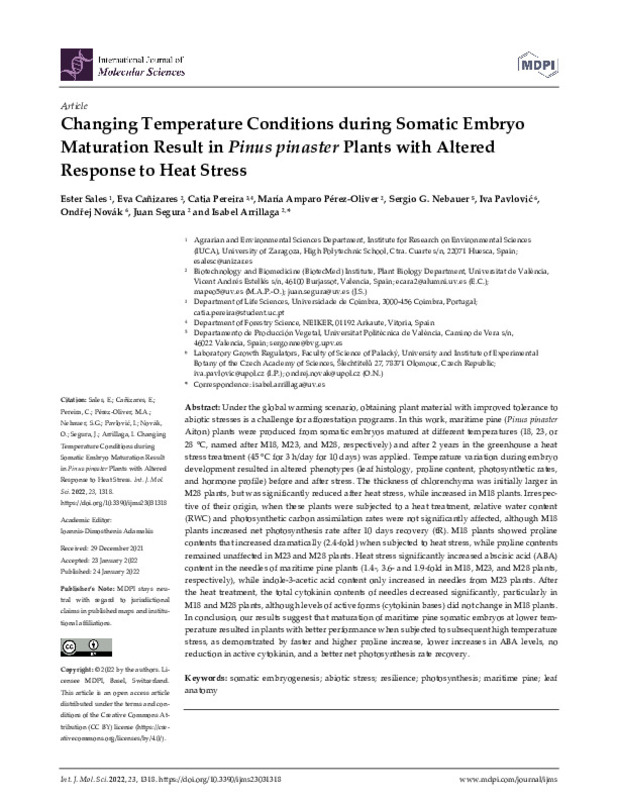JavaScript is disabled for your browser. Some features of this site may not work without it.
Buscar en RiuNet
Listar
Mi cuenta
Estadísticas
Ayuda RiuNet
Admin. UPV
Changing Temperature Conditions during Somatic Embryo Maturation Result in Pinus pinaster Plants with Altered Response to Heat Stress
Mostrar el registro sencillo del ítem
Ficheros en el ítem
| dc.contributor.author | Sales, Ester
|
es_ES |
| dc.contributor.author | Cañizares, Eva
|
es_ES |
| dc.contributor.author | Pereira, Catia
|
es_ES |
| dc.contributor.author | Pérez-Oliver, María Amparo
|
es_ES |
| dc.contributor.author | Nebauer, Sergio G.
|
es_ES |
| dc.contributor.author | Pavlovic, Iva
|
es_ES |
| dc.contributor.author | Novak, Ondrej
|
es_ES |
| dc.contributor.author | Segura, Juan
|
es_ES |
| dc.contributor.author | Arrillaga, Isabel
|
es_ES |
| dc.date.accessioned | 2023-05-25T18:01:23Z | |
| dc.date.available | 2023-05-25T18:01:23Z | |
| dc.date.issued | 2022-02 | es_ES |
| dc.identifier.uri | http://hdl.handle.net/10251/193608 | |
| dc.description.abstract | [EN] Under the global warming scenario, obtaining plant material with improved tolerance to abiotic stresses is a challenge for afforestation programs. In this work, maritime pine (Pinus pinaster Aiton) plants were produced from somatic embryos matured at different temperatures (18, 23, or 28 degrees C, named after M18, M23, and M28, respectively) and after 2 years in the greenhouse a heat stress treatment (45 degrees C for 3 h/day for 10 days) was applied. Temperature variation during embryo development resulted in altered phenotypes (leaf histology, proline content, photosynthetic rates, and hormone profile) before and after stress. The thickness of chlorenchyma was initially larger in M28 plants, but was significantly reduced after heat stress, while increased in M18 plants. Irrespective of their origin, when these plants were subjected to a heat treatment, relative water content (RWC) and photosynthetic carbon assimilation rates were not significantly affected, although M18 plants increased net photosynthesis rate after 10 days recovery (tR). M18 plants showed proline contents that increased dramatically (2.4-fold) when subjected to heat stress, while proline contents remained unaffected in M23 and M28 plants. Heat stress significantly increased abscisic acid (ABA) content in the needles of maritime pine plants (1.4-, 3.6- and 1.9-fold in M18, M23, and M28 plants, respectively), while indole-3-acetic acid content only increased in needles from M23 plants. After the heat treatment, the total cytokinin contents of needles decreased significantly, particularly in M18 and M28 plants, although levels of active forms (cytokinin bases) did not change in M18 plants. In conclusion, our results suggest that maturation of maritime pine somatic embryos at lower temperature resulted in plants with better performance when subjected to subsequent high temperature stress, as demonstrated by faster and higher proline increase, lower increases in ABA levels, no reduction in active cytokinin, and a better net photosynthesis rate recovery. | es_ES |
| dc.description.sponsorship | This research was funded by MICINN and by the European Regional Development Fund Project (AGL2016-76143-C4-01-R). This work was also supported by the Czech Science Foundation (20-22875S) and the Ministry of Education, Youth and Sports of the Czech Republic, from the European Regional Development Fund (CZ.02.1.01/0.0/0.0/16_019/0000827). | es_ES |
| dc.language | Inglés | es_ES |
| dc.publisher | MDPI AG | es_ES |
| dc.relation.ispartof | International Journal of Molecular Sciences | es_ES |
| dc.rights | Reconocimiento (by) | es_ES |
| dc.subject | Somatic embryogenesis | es_ES |
| dc.subject | Abiotic stress | es_ES |
| dc.subject | Resilience | es_ES |
| dc.subject | Photosynthesis | es_ES |
| dc.subject | Maritime pine | es_ES |
| dc.subject | Leaf anatomy | es_ES |
| dc.subject.classification | FISIOLOGIA VEGETAL | es_ES |
| dc.title | Changing Temperature Conditions during Somatic Embryo Maturation Result in Pinus pinaster Plants with Altered Response to Heat Stress | es_ES |
| dc.type | Artículo | es_ES |
| dc.identifier.doi | 10.3390/ijms23031318 | es_ES |
| dc.relation.projectID | info:eu-repo/grantAgreement/FEDER//CZ.02.1.01%2F0.0%2F0.0%2F16_019%2F0000827/ | es_ES |
| dc.relation.projectID | info:eu-repo/grantAgreement/GACR//20-22875S/ | es_ES |
| dc.relation.projectID | info:eu-repo/grantAgreement/MICINN//AGL2016-76143-C4-01-R/ | es_ES |
| dc.rights.accessRights | Abierto | es_ES |
| dc.contributor.affiliation | Universitat Politècnica de València. Escuela Técnica Superior de Ingeniería Agronómica y del Medio Natural - Escola Tècnica Superior d'Enginyeria Agronòmica i del Medi Natural | es_ES |
| dc.description.bibliographicCitation | Sales, E.; Cañizares, E.; Pereira, C.; Pérez-Oliver, MA.; Nebauer, SG.; Pavlovic, I.; Novak, O.... (2022). Changing Temperature Conditions during Somatic Embryo Maturation Result in Pinus pinaster Plants with Altered Response to Heat Stress. International Journal of Molecular Sciences. 23(3):1-16. https://doi.org/10.3390/ijms23031318 | es_ES |
| dc.description.accrualMethod | S | es_ES |
| dc.relation.publisherversion | https://doi.org/10.3390/ijms23031318 | es_ES |
| dc.description.upvformatpinicio | 1 | es_ES |
| dc.description.upvformatpfin | 16 | es_ES |
| dc.type.version | info:eu-repo/semantics/publishedVersion | es_ES |
| dc.description.volume | 23 | es_ES |
| dc.description.issue | 3 | es_ES |
| dc.identifier.eissn | 1422-0067 | es_ES |
| dc.identifier.pmid | 35163242 | es_ES |
| dc.identifier.pmcid | PMC8835971 | es_ES |
| dc.relation.pasarela | S\455825 | es_ES |
| dc.contributor.funder | European Regional Development Fund | es_ES |
| dc.contributor.funder | Grant Agency of the Czech Republic | es_ES |
| dc.contributor.funder | Ministerio de Ciencia e Innovación | es_ES |
| dc.subject.ods | 15.- Proteger, restaurar y promover la utilización sostenible de los ecosistemas terrestres, gestionar de manera sostenible los bosques, combatir la desertificación y detener y revertir la degradación de la tierra, y frenar la pérdida de diversidad biológica | es_ES |








